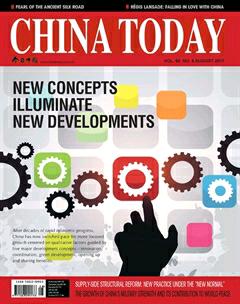The Pace of Innovation
By+staff+reporter+CHEN+JUN

INNOVATION is acknowledged as a primary force for promoting economic development. Consequently many countries globally seek innovative technological, industrial and mechanistic breakthroughs. The positive impact of innovation irrefutably proven, it is a concept that leads Chinas development.
Anhui Province, located in central-eastern China, is an important part of the Yangtze River Delta. The construction of the “Belt and Road” and the Yangtze River Economic Zone have brought Anhui, at the crossroads, rare and abundant development opportunities.
Many people associate Anhui with Huangshan Mountains breathtaking scenery, delectable cuisine, or the long history of papermaking. However, upon paying a visit to Anhui their foremost impression is of bold innovation.
Leader of Technological Innovation
How is innovation apparent in Anhuis science and technology The answer is plain to see at the Institute of Advanced Technology, University of Science and Technology of China. Located in Hefei State Hi-tech Industry Development Zone, the institutes focus is on developing high-tech R&D and cultivating high-level talents. It is integral to advancing the University of Science and Technology of China to a world-class research university.
On display in one of the Institutes halls are examples of Anhuis independent innovative technologies and products. They include the first Chinese independent R&D platform for the interactive robot, the largesized liquid crystal display panel, the graphene based composite, microturbines, nano-water purification technology, insulin capsules, the Chery aluminium electric vehicle, and the JAC iev6s electric SUV.
In August 16, 2016, China launched worlds first quantum experimental communications satellite Mozi, which can achieve quantum cryptography communication between space and Earth. The control center of the experimental quantum communication system is at the Institute of Advanced Technology, University of Science and Technology of China.
On June 16, 2017, China was the first to achieve the 1,000-km level of space-Earth two-way quantum distribution of entangled photon pairs. This broke the previous, longstanding international 100-km level record, as announced by Pan Jianwei, chief scientist on quantum experimental satellite and vice president of University of Science and Technology of China. This experiment also brought plaudits from international experts in this field who hailed it as “world-leading.”
In addition to the quantum scientific experiment, Anhui has also contributed many other unique scientific achievements. They include the opening of the Shanghai-Hefei section of the worlds first quantum cryptography network. The worlds thinnest 0.15 mm information displayed touch sensor has also gone into mass production. Moreover, Tokamak at the Hefei Institute of Physical Science, Chinese Academy of Sciences, has achieved the worlds first minute-level steady state high constraint mode operation. And the worlds first intelligent interactive robot that provides customer service has been developed and put into operation.
Innovation is the primary force driving development. According to Chinese Regional Innovation Capacity Report 2016, Anhui has maintained its ninth ranking in China as a whole and pole position in central China for five years running. In the first quarter of 2017, among all industrial enterprises above designated size, Anhuis hi-tech industry added value reached RMB 103.83 billion, an increase of 14.4 percent, and the production value of its strategic emerging industries reached RMB 272.36 billion, a 22.7 percent increase.
On January 10, 2017, the National Development and Reform Commission and the Ministry of Science and Technology officially authorized Anhuis construction of the national comprehensive
science center in Hefei. This is the second of its kind to receive official government approval, the first having been built in Shanghai. The decision signifies Anhuis im-portant position in the national innovation configuration; and also the importance of its role in representing China in the competitive global technology and cooperation market.
From Technology to Industry
Innovation is the point of intersection between technology and industry. Heightening the industrialization of technology has been a huge obstacle to innovation.
To accelerate the industrialization of artificial intelligence (AI), integrate various resources, to set up an industrial platform, Anhui Information Investment established the first AI presentation hall in Anhui. Named “China Speech Valley,” it is located in the Hefei State Hi-tech Industry Development Zone.
“Left-click the mouse and speak, and so vocally surf the Internet and key in words.” Cui Zijing, marketing director of Anhui MiMouse, demonstrated the companys intelligent voice mouse to reporters in the 1,000-sq meters “China Speech Valley” experience center. Upon his saying, “Welcome to Anhui,” the corresponding Chinese characters were immediately displayed on the screen in Word. Cui then said, “I want to watch In the Name of People.” The URL of this soap opera immediately appeared on the screen. Whether for purposes of surfing or keying in through voice identification, the mouse functions both accurately and fast. It is also compatible with English, Russian, Japanese and other languages. By January 2017 sales of the mouse had reached more than RMB 40 million.
The intelligent voice and AI trades are strategic emerging industries. Enterprises in these lines are mainly start-up companies, and highly innovative. But they have limited ability to adapt to market competition. “The absence of any policy to support this platform makes it difficult for these innovative startups to succeed.” Yu Yanxing, the representative of the start-up Anhui Samxvm Information Technology Co., Ltd., introduced China Speech Valley and its focus on supporting intelligent and innovative business incubation. China Speech Valley provides services for enterprises in the zone through setting up various resourcesharing platforms that improve their cooperation and development. It has also become an important stage for enterprises to promote their products and invest in the market.
“For innovative start-ups, industrialization is much more important than technology itself. So the evaluation index for enterprises in the zone is not expertise or advanced technologies, but rather their market share,”CEO of Anhui Information Investment Qi Dongfeng said. Qi went on to say that in order to facilitate enterprises more rapid entry into the market, before a product is released a professional mentor team, comprising CEOs of technology companies or investment experts, provides them with guidance. Meanwhile, during the marketing process China Speech Valley holds and participates in many science and technology exhibitions to expand the exposure of R&D products. It also proactively builds various resource-sharing platforms that promote them on the market.
Technology must be applied to products, which shall be developed into industries. And single enterprises must converge into integrated zones. “The China Speech Valley experience center not only helps enterprises to deal with marketing difficulties, but more importantly, utilizes the central model effects to promote industrial agglomeration, so attracting more and more artificial intelligence-related industries to China Speech Valley,” Qi Dongfeng said.
In the future, China Speech Valley will incubate more than 1,000 companies and cultivate a number of giant enterprises, so forming a strengthened AI industrial chain. At the same time, China Speech Valley will utilize the benefits stemming from an industrial cluster. The industrial scale is expected to reach RMB 100 billion.
Leading the Era of AI
On February 3, 2017, the New York Times published an article on AI development trends in China and the U.S., giving high praise to the leading technology of Iflytek Co., Ltd. Liu Qingfeng, chairman of Iflytek, proudly announced that from intelligent voice to AI, Iflytek has the worlds most advanced algorithms, and this is putting the company at the forefront of the sector.
“Nobody in China had explored the intelligent voice industry when we first started. Our company incurred losses during the first four years, and by the fifth year our profits just about covered the loss,” Liu Qingfeng said.
Looking back over the 18 years of progress, Vice President of Iflytek Xu Yulin told the reporter, “Innovation and persistence have been our most precious resources.” Xu recalled that Iflyteki had been offered, but rejected many chances to turn a quick profit.
Having progressed from an 18-member team and experienced an 18-year expansion, Iflytek has become a world-class intelligent voice enterprise with a market value of more than RMB 40 billion. Its products now cover 27 languages, and those in Chinese and English constitute the global No. 1. This Chinese brand has achieved worldwide recognition.
In 2014, as the artificial intelligence era approached, Iflytek proposed a “new superfly brain”plan. The aim was to make robots able not only to listen and speak but also understand and think, so to create a Chinese intelligent cognitive engine. This will lead to the future application of intelligence to domestic tasks, education, customer service, healthcare, and other areas. And in 2015, Iflytek redefined the criteria for human-computer interaction in the Internet of Things era and released the AIUI – a human-computer interactive interface that represents a milestone in the AI industry. Furthermore, in 2016, the rapid growth of users and start-up teams related to the Iflytek AI platform led over a million people to mass entrepreneurship and innovation.
On April 26, 2016, President Xi Jinping visited an exhibition on Anhuis innovative scientific results. He also watched the Iflytek intelligence voice and AI presentation. Xi highly commended their achievements and encouraged them to focus on R&D. He also hoped that Iflytek would maintain its leading role and simultaneously apply the core technologies to everyday life.
Xu Yulin acknowledged this as great encouragement to Iflytek. “This will inspire us to make more R&D efforts to bring the people better service.” Xu also mentioned that Iflytek is promoting many new applications for the education, finance, medicine, information security and other fields.
As in April 2017, the Iflytek platform had acquired one billion users and provided services for 300,000 start-ups. The number of interactions now stands at 3.5 billion times per day. This implies that the AI ecology centering on Iflytek is under construction.
Artificial intelligence in future will not be competition between technologies, nor competition between enterprises, but competition between ecologies. “Faced with opportunities and challenges, Iflytek is confident of becoming a world-class giant IT enterprise,” Xu Yulin concluded.

